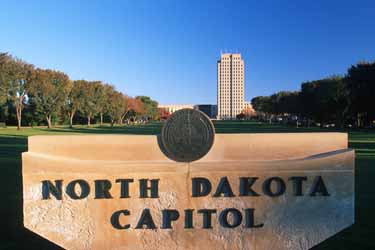Expensive ‘Medical Expert’ Testimony, Referendum Petitions: Coming Up in North Dakota?
A look at the past shows that whatever avenue is taken, the fight for abortion rights in North Dakota will be long and expensive.

A look at North Dakota’s past shows that whatever avenue is taken in the fight for and against unconstitutional abortion bans in the state, that fight will be long and expensive.
Recently, a local judge ruled to permanently block an unconstitutional abortion ban in North Dakota. Unfortunately, it was a ban from 2011. As Jessica Mason Pieklo reported last week, a bill that restricted how practitioners could offer medication abortion in the state was ruled unconstitutional and permanently blocked from becoming law. The bill has been blocked and litigated ever since it was signed into law, and the loss will now leave the state on the hook to pay all legal expenses. It’s an experience that should make a state gun shy about heading straight back into defending unconstitutional laws, but anti-choice legislators in North Dakota remain undaunted.
There are a number of different ways that the state may end up back in court. Just this session the state passed a ban on abortions after 20 weeks’ gestation, after a fetal heartbeat can be detected, on abortions procured due to a genetic anomaly, and even restrictions meant to close the only clinic in the state by requiring admitting privileges that practitioners say are nearly impossible to obtain. It’s unclear yet whether each law will get a separate lawsuit, if they will be bundled, or if a “referendum” process could block them before litigation. All that is clear is that any way this goes, it will be expensive.
State Attorney General Wayne Stenehjem is already asking for $400,000 in funding to defend the state laws once they go to court, funding the AG sees as necessary despite bill sponsors claiming that the legal expenses would be minimal; anti-choice legal groups were offering to defend the bans free of cost. Stenehjem admits he has no idea how much the state’s defense costs could run outside that assistance, and made his request based on similar battles in other states like Idaho and Arkansas.
Maybe that was enough money in those states, but neither Idaho nor Arkansas was trying to defend four unconstitutional measures at the same time. Much of the money would be used to pay for “expert witnesses.” For instance, the state just paid $21,000 for Dr. Donna Harrison, the president the American Association of Pro-Life Obstetricians and Gynecologists, to testify in the failed medication abortion trial. Because the state lost its case, those expenses will not be reimbursed as they would have if the judge had ruled it its favor. “You have to have some expensive medical expert testimony, and that can be as expensive as any of the lawyers’ fees,” Stenehjem explained to Bloomberg News, trying to justify the $400,000 price tag.
“Heartbeat” ban sponsor Rep. Bette Grande (R-Fargo) says the expenses are worth it. “What is the price of life?” Grande said to the Associated Press. “I guess every person has to ask that of themselves.”
Grande and her compatriots may be questioning the “price of life,” but many citizens of North Dakota are questioning the waste of taxpayer dollars. Helped in part by the American Civil Liberties Union of North Dakota, ban opponents are taking to Facebook and Twitter to explain what they would rather do with the nearly half a million dollars that the AG is requesting. Requests range from student loan forgiveness and tuition reimbursement to childcare expenses and support for individuals with special needs. One respondent even implored, “Fix your roads!”
The backlash from the public is spilling not just onto social media, but into the general population. Citizens are desperately seeking a way to more actively show their disagreement with the legislators who passed the bills. It is to that group that the activists (both pro- and anti-choice) who are pushing a referendum on the bills is hoping to appeal. The North Dakota Secretary of State has given permission for activist and legal abortion opponent Gary Hangsleben to begin collecting signatures to put the laws up for a popular vote, but it’s an avenue that few besides Hangsleben himself is interested in supporting. Hangsleben appears to recognize that his referendum isn’t a popular action with either side. “I’m sure (the petitions) will be scoured by people on both sides trying to find something to get them thrown out,” he told the Forum News Service.
For abortion opponents, a referendum could undo the work that they put into ensuring that the bills make it to court and potentially create an environment to reevaluate Roe v. Wade. For abortion rights supporters, a referendum could create the impression that it’s popular support—not the constitutionality of a law—that matters when it comes to a person’s civil rights. If abortion is legal, it is legal because it is a guaranteed right, not because a majority of people in a given location at a given time agree with it.
Without the requisite number of signatures for the referendum, the bans will go into effect August 1, unless a challenge comes first. With a court challenge, many if not all of the bills will never go into effect at all. The most likely scenario would be a challenge to the “heartbeat” ban and the TRAP bill, both of which would in essence ban abortion in the state, while the fetal anomaly and “pain” bans would be allowed to go into effect unchallenged since there are seldom abortions performed late enough in the state to fall into either category. With only two laws to be challenged, the state may have more of a chance of not blowing its $400,000 budget, but that doesn’t mean there won’t still be a lot of lawmakers justifying the expense to their constituents in the next election cycle.
